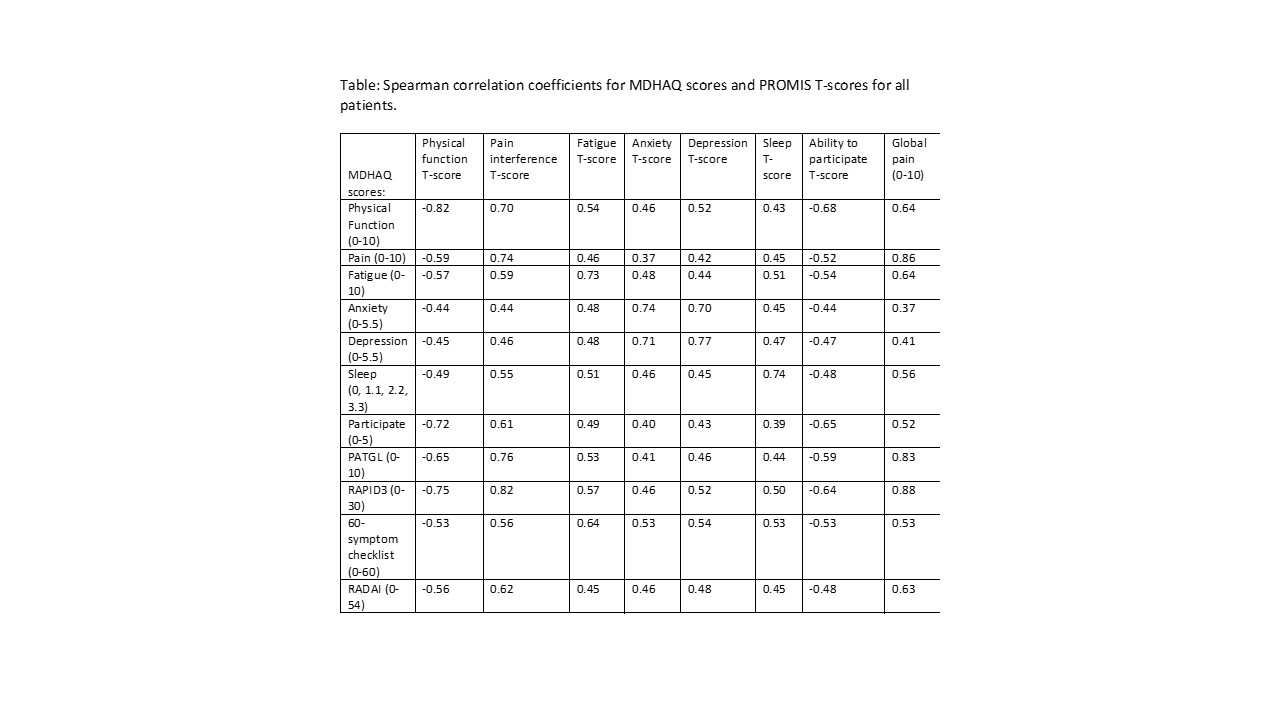Session Information
Date: Sunday, November 7, 2021
Title: Patient Outcomes, Preferences, & Attitudes Poster II: Measurements (0739–0763)
Session Type: Poster Session B
Session Time: 8:30AM-10:30AM
Background/Purpose: PROMIS-29 (patient-reported outcome measurement information system) has been extensively validated in many diseases according to standard deviations from normalized T-scores for 7 domains. It was developed through literature review, investigator consensus, item response theory analysis and expert review of scaling results from multiple PROMIS data sets. The domains are physical function, pain interference, fatigue, anxiety, depression, sleep quality and ability to participate, and it has construct validity and reliability in many diseases, including RA and other rheumatic diseases (Katz P et al Arth Care & Res. 2017;69:1312-21). An MDHAQ (multidimensional health assessment questionnaire) queries similar domains having been developed in clinical care by continuous quality improvement cycles. MDHAQ scores may be more intuitively understood by health professionals, and MDHAQ includes 3 indices which agree 80-90% with reference indices that require additional measures and are less feasible in busy clinical settings: RAPID3 (routine assessment of patient index data) to assess patient status; FAST4 (fibromyalgia assessment screening tool) to screen for fibromyalgia (Gibson, J Rheumatol. 2020;47:761-9); and DEP2 (Morla, Arth Care & Res 2021;73:120-9) to screen for depression (Dep). High correlations have been reported between PROMIS T-scores vs RAPID3 (Yun et al Arth Care & Res. 2020;72:553-60), suggesting a hypothesis that 7 PROMIS-29 vs MDHAQ domains may provide similar information, as studied here.
Methods: Both PROMIS-29 and MDHAQ were completed at the same routine rheumatology encounter. PROMIS-29 T-scores were obtained by submitting the data to the HealthMeasures Scoring Service, powered by Assessment CenterSM (https://www.assessmentcenter.net/ac_scoringservice). MDHAQ scores and indices were computed in the clinic. MDHAQ and PROMIS T-scores were compared in all patients, rheumatoid arthritis (RA) and non-RA patients by Spearman correlations and a series of linear regressions in which each PROMIS-29 T-score served as a dependent variable and MDHAQ scores as independent variables, and vice versa. Scores were also compared according to FAST4 status; (1 point each for pain >6/10, fatigue >6/10, symptom checklist >16/60, and self-report painful joint count >16/54 where 3/4 =FM).
Results: PROMIS-29 and MDHAQ were completed at the same visit by 571 patients, 225 with RA and 346 with other diagnoses. All 7 MDHAQ and PROMIS-29 domains were correlated significantly (rho=-0.65 to 0.82, p< 0.001) in all patients (Table), similar in RA and non-RA patients. Significantly poorer status was seen in both RA and non-RA patients with FM vs no FM according to FAST4 (data not shown). Regressions explained 53-81% of the variation in PROMIS T-scores by MDHAQ domains and 44%-82% of the variation in MDHAQ domains by PROMIS T-scores.
Conclusion: MDHAQ and PROMIS-29 give similar information in rheumatology patients. PROMIS has advantages for clinical research, while MDHAQ provides additional clinical information and is intuitive for busy clinical settings.
Participate (0-5) = Participate in Recreational Activities or Sports (0_3) + Social activity in 60-symptom (0 for No, 2 for Yes).
Anxiety (0-5.5) = Anxiety (0_3.3) + Anxiety in 60-symptom (0 for No, 2.2 for Yes).
Depression (0-5.5) = Depression (0_3.3) + Depression in 60-symptom (0 for No, 2.2 for Yes).
To cite this abstract in AMA style:
Gibson K, Li T, Luta G, Pincus T. MDHAQ (Multidimensional Health Assessment Questionnaire) and PROMIS-29 (patient-reported Outcomes Measurement Information System) Domains for Physical Function, Pain, Fatigue, Anxiety, Depression, Sleep, and Ability to Participate Provide Virtually Identical Information [abstract]. Arthritis Rheumatol. 2021; 73 (suppl 9). https://acrabstracts.org/abstract/mdhaq-multidimensional-health-assessment-questionnaire-and-promis-29-patient-reported-outcomes-measurement-information-system-domains-for-physical-function-pain-fatigue-anxiety-depression-sle/. Accessed .« Back to ACR Convergence 2021
ACR Meeting Abstracts - https://acrabstracts.org/abstract/mdhaq-multidimensional-health-assessment-questionnaire-and-promis-29-patient-reported-outcomes-measurement-information-system-domains-for-physical-function-pain-fatigue-anxiety-depression-sle/

